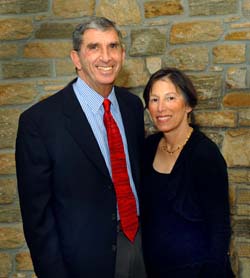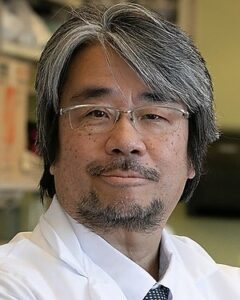 MARGERY POZEFSKY, Bus 1964, who passed away in 2012, and her husband, THOMAS POZEFSKY, M.D., an internist in private practice and assistant professor in the Division of Endocrinology and Metabolism in the Department of Medicine at Johns Hopkins University School of Medicine, have a long history of philanthropy with Johns Hopkins stemming from the Pozefskys’ personal experience with living donor transplantation. Initially, they provided funding to the Incompatible Kidney Transplant Program and this gift paved the way for further advances within the program, including the addition of Kidney Paired Donation. In 2005, the Pozefsky family and others generously supported a Kidney Paired Donation Consensus meeting in Chicago, convened by the Hopkins transplant team to facilitate national collaborations among transplant experts. More recently, the Pozefsky family partnered with the Johns Hopkins transplant team to work toward a national system for kidney paired donation that would benefit all kidney transplant patients. In endowing this professorship, the family further supports pioneering novel approaches in the field of kidney transplantation.
MARGERY POZEFSKY, Bus 1964, who passed away in 2012, and her husband, THOMAS POZEFSKY, M.D., an internist in private practice and assistant professor in the Division of Endocrinology and Metabolism in the Department of Medicine at Johns Hopkins University School of Medicine, have a long history of philanthropy with Johns Hopkins stemming from the Pozefskys’ personal experience with living donor transplantation. Initially, they provided funding to the Incompatible Kidney Transplant Program and this gift paved the way for further advances within the program, including the addition of Kidney Paired Donation. In 2005, the Pozefsky family and others generously supported a Kidney Paired Donation Consensus meeting in Chicago, convened by the Hopkins transplant team to facilitate national collaborations among transplant experts. More recently, the Pozefsky family partnered with the Johns Hopkins transplant team to work toward a national system for kidney paired donation that would benefit all kidney transplant patients. In endowing this professorship, the family further supports pioneering novel approaches in the field of kidney transplantation.
Margery K. and Thomas Pozefsky Professorship in Kidney Transplant Surgery
School of Medicine
Surgery
Established in 2007 through a commitment made by the Pozefsky Family
Held by Kazuhiko Yamada
 KAZUHIKO YAMADA, M.D., is the Margery K. and Thomas Pozefsky Professor in Kidney Transplant Surgery at the Johns Hopkins School of Medicine and serves as director of xenotransplantation at the Johns Hopkins Hospital.
KAZUHIKO YAMADA, M.D., is the Margery K. and Thomas Pozefsky Professor in Kidney Transplant Surgery at the Johns Hopkins School of Medicine and serves as director of xenotransplantation at the Johns Hopkins Hospital.
In August 2022, Dr. Yamada moved from Columbia University where he was professor of surgery and medicine (with tenure), and director of surgical research at the Columbia Center for Translational Immunology (CCTI). After Dr. Yamada qualified as a board-certified urologist in Japan, he joined the Transplantation Biology Research Center (TBRC) at Massachusetts General Hospital (MGH). He was promoted to instructor of surgery at Harvard Medical School (HMS) in 1998, to assistant professor of surgery in 2000, and to associate professor of surgery in 2004 at HMS. He joined the Columbia Center for Translational Immunology (CCTI) in 2015 and was appointed to professor of surgical sciences in surgery, at Columbia University Medical Center (CUMC) and director of surgical research, CCTI in 2015, and professor with tenure, Department of Surgery, Columbia University in 2016.
Dr. Yamada has a broad background in transplantation immunology as well as in transplant surgery. He has conducted both allogeneic and xenogeneic transplantation projects at the TBRC in MGH, the CCTI at CUMC, and now at Johns Hopkins. He has been responsible for seeking mechanisms of transplant tolerance in pre-clinical large animal models and developing innovative strategies for the induction of tolerance across both allogeneic and xenogeneic barriers in large animal translational research models. Dr. Yamada has been awarded numerous NIH grants with over US 25 million dollars as either PI or PL. He also received 21.4 million US dollars in industry funding in 2022-2024. He is an expert in transplantation translational research with over 1,000 cases of allogeneic and xenogeneic kidney, thymus, islet, and heart transplantation in both miniature swine and non-human primates. More specifically, he has extensively studied the role of the thymus and vascularization of cells/tissue in the induction of tolerance. He has developed innovative composite vascularized organs known as thymo-kidneys and islet-kidneys (composite IK). These composite organs demonstrate the importance of pre-vascularization of cells in the successful induction of transplantation tolerance in preclinical MHC inbred miniature swine models (JI 2000, PNAS 2004, Transplantation 2002, Diabetes 2002, AJT 2010, AJT 2016 etc). He has extended vascularized thymus (VT) Tx model to pig-to-baboon xenotransplant and achieved longer than 6 months normal creatinine levels with pig-specific unresponsiveness and new thymic emigrants from the co-transplanted donor VT graft (AJT 2017, Transplant Int 2018, Nature Med 2005). He has also successfully induced tolerance and corrected hyperglycemia by a composite IK graft with a short course of immunosuppression in totally pancreatectomized miniature swine (Diabetes 2002, Transplantation 2002) and successfully induced allograft tolerance of both islets and kidneys with transient mixed chimerism across a “mother to son” haploidentical barrier using reduced intensity mixed chimerism protocols (ITC regimen) in NHP (AJT 2016). More recently, Dr. Yamada has achieved durable multilineage macrochimerism for more than one year following HSCTx without GvHD – the first demonstration of durable mixed chimerism in a nonhuman primate model, and demonstrated that this regimen leads to tolerance of kidneys transplanted from the same donor.
His research was introduced in Nature Med, 2012), Nature Review (2013), JASN (2014), Harvard Med Focus and in a book “Xeno Chronicles” (2005. G. Wayne Miller). He has published over 190 peer-reviewed articles in American or European journals and more than a dozen fellows have received Congress awards, including a mentor/mentee award from the Transplantation Society.